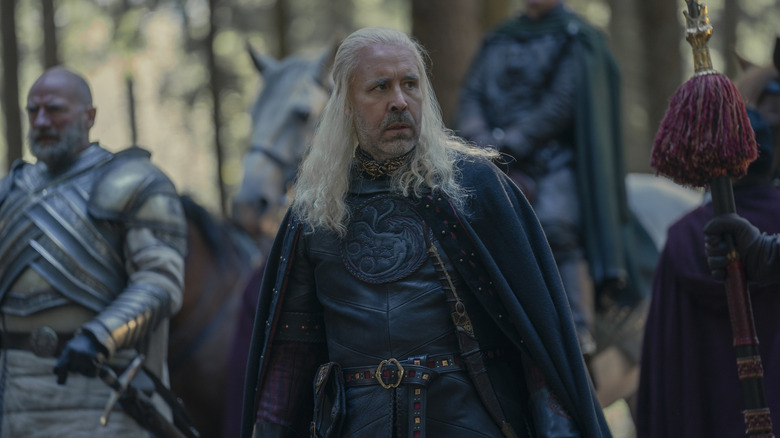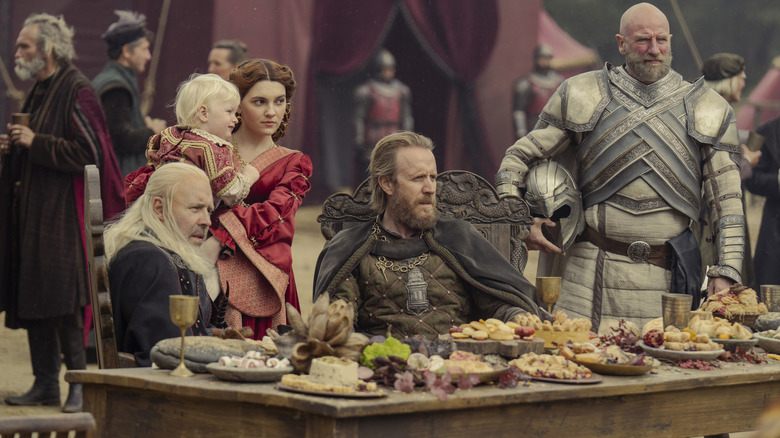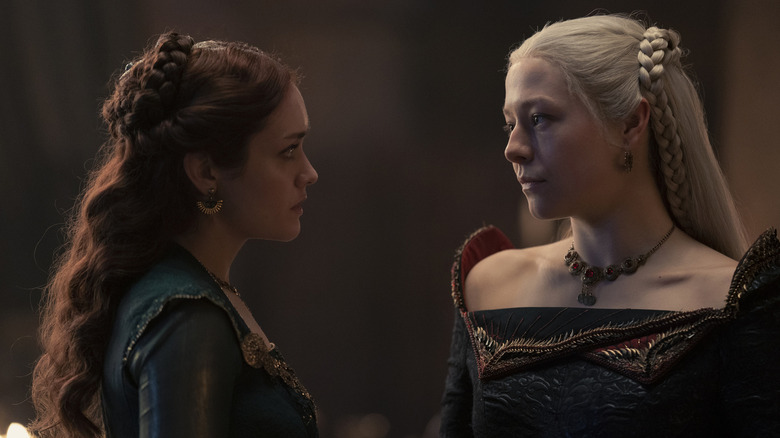House Of The Dragon's Greatest Strength Is That It Doesn't Waste Your Time
You know all those before and after photos showing how the United States presidency can drastically age an individual in just four to eight years? That's absolutely nothing compared to the larger-than-life stresses and concerns plaguing whichever ruler happens to have the misfortune of sitting the Iron Throne. Take the morosely ineffectual King Viserys (Paddy Considine) on "House of the Dragon," for example, who's currently stuck dealing with his troublesome brother Daemon (Matt Smith), the ongoing war on the Stepstones that's wreaking political havoc, and the profound discontent of his jilted daughter and would-be heir apparent Rhaenyra (Milly Alcock) who suddenly feels at risk of being replaced by her step brother Aegon.
Episode three, titled "Second of His Name," puts all these struggles in sharp relief ... but only thanks to the show's accelerated timeline, allowing viewers to see the wide spectrum of life events affecting our main characters as the years drag on. The premiere alone skipped almost a decade between the prologue and the episode's main events, followed by episode two leaping forward another six months. The most drastic current-day time jump occurred with the most recent episode, taking place three entire years after Viserys announced his intentions to marry Alicent Hightower (Emily Carey). The biggest result of this approach, beyond giving us a fast-forward look at the king's receding hairline (and his green-screened missing fingers, of course), has been the fact that the structure of "House of the Dragon" contains zero unnecessary fat.
In other words, this series doesn't waste any time at all on the monotonous aspects of Viserys' reign or the long periods of inactivity between the action. That, undeniably, has been for the best.
Pace yourselves
A lot can happen in just a few years — just ask Alicent Hightower, who has gone from Princess Rhaenyra's trusted confident and friend to a bitter political rival threatening to wrest control of the Iron Throne away from her.
Compared to the much more languid "Game of Thrones," this breakneck sense of pacing in the early going of "House of the Dragon" might be the biggest change between the original and the prequel. That's mostly due to the sheer scale of the story told in author and series co-creator George R.R. Martin's "Fire & Blood" book, which acts as a sort of in-universe historical document that chronicles the events of House Targaryen's reign. Because of his affinity for borrowing from real-world history, that means a confusing family tree filled with annoyingly similar names, seemingly distant wars and conflicts that will have massive ramifications, and a propensity to go entire swaths of time where nothing of note ever really happens.
Since the latter would be terribly boring for an HBO series to depict on-screen, the creative team behind "House of the Dragon" have instead picked and chosen their spots to move forward in time and remove even the hint of filler or padding from the picture. Rather than spin its narrative wheels waiting for Viserys' son Aegon to grow up or compact a plethora of game-changing events into an incredibly short amount of time — looking back at "Game of Thrones," one amusing footnote comes from the fact that so many would-be rulers rise and fall and so many wars begin and end in such quick succession — "House of the Dragon" opts for a more common-sense approach that allows each episode to hit hard.
In fact, these time jumps may soon become the show's not-so-secret weapon.
The recasting that was promised
The show's frequent time jumps have inevitably brought up complaints that this method resets the status quo too soon, robbing the characters (and viewers) of key emotional exchanges, much like the aforementioned friendship between Rhaenyra and Alicent curdling into tense standoffs with little hope of making amends ... most of which took place off-screen. Despite these arguments, it's still entirely possible that future scenes between the two will fill in the gaps, allowing the full weight of time to raise the stakes even further. But even more to the point, perhaps the best is still to come.
Viewers have known for some time that the characters of Rhaenyra and Alicent will eventually be recast, with Emma D'Arcy and Olivia Cooke stepping into the respective roles. Although Alcock's performance in particular has rightfully earned universal praise, the decision to eventually skip ahead to their adult years will unmistakably emphasize just what's at stake in this prequel. Anyone familiar with Martin's writing knows that there really aren't any "good guys" in these stories, which makes anyone capable of either tremendous good or gut-churning betrayals. Viewers would be wise to brace themselves for the worst, assisted by all the maturity and skill that Cooke and D'Arcy are uniquely positioned to imbue.
As much as "Game of Thrones" earned its label as a pop culture titan, it arguably never achieved the label of an "epic," which comes with the passage of time and the feeling that such events will echo for generations to come. By foregrounding the idea of prophecy and teasing a civil war that will shake the Targaryen dynasty straight through to the events of "Game of Thrones" hundreds of years later, "House of the Dragon" may be poised to leap ahead of its predecessor and accomplish what its parent series could not. By the time the season comes to a close and we're looking ahead to season 2, we may just have those jarring time jumps to thank for it.


